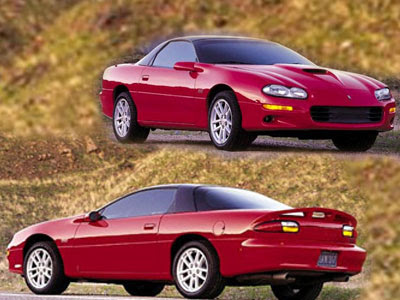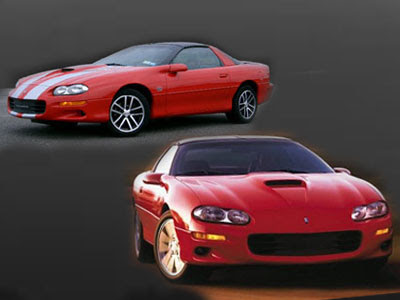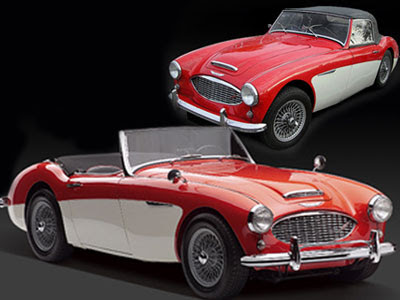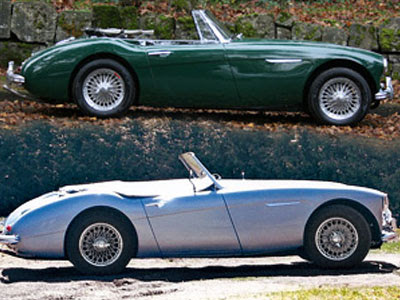Z28 Chevrolet Camaro LS1 V8 Sports Coupe

Z28 Chevrolet Camarore LS1 V8 Sports Coupe
The MK IV Chevrolet Camaro retained the same layout as the very first Camaro's back in 1967, 2-doors, 2+2 seating, rear-wheel drive, choice of V6 and V8 powerplants, and available in both coupe and convertible forms (the convertible was introduced in 1994).
The fourth-generation Chevrolet Camaro debuted for the 1993 model year on the previous generation Camaro platform.

Z28 Chevrolet Camarore LS1 V8 Sports Coupe
The MK4 Camaro featured the 5.7 L (350 cid) LT1 V8 engine that had been introduced in the Corvette one year earlier, as well as an optional six-speed manual transmission. The 1998 model year was refreshed and revised with both exterior and engine changes. Replacing the LT1 was GM's all-new 5.7 L (346 cid) LS1 which had been introduced with the Corvette C5.
The Camaro is to return in 2009 however as a retro styled sports coupe.
The fourth-gen Camaro would last up through the 2002 model year, at which point production was stopped due to slow sales.
Frogeye Sprite Austin Healey the first of several Sprite models
Frogeye Sprite Austin Healey
Frogeye Sprite Austin Healey the first of several Sprite models.
The Austin Healey Sprite which was introduced in 1958 was a diminutive roadster with an unmistakable headlight arrangement.
The prominent headlights were initially intended to be flip-up units. However the cost of retractable headlights was to high, and instead they were fixed in what would have been the 'up' position. Their unusual location gave rise to the cars affectionate nickname, the "Frogeye" Sprite.
The Austin Healey Sprite MK I was powered by a 1.0 litre, inline, four cylinder engine which developed a grand total of 43 horsepower. Coupled to a four speed manual gearbox it was capable of propelling the car up to 84 mph.
The Frogeye Sprite (which was discontinued in 1961) was the first of several Sprite models. In 1962 the MK II Austin Healey Sprite was introduced. The MK II introduced several updates, the most noticeable of which was a more conventional headlight layout. From 1961 the Austin Healey Sprite was also sold as the MG Midget.
The prominent headlights were initially intended to be flip-up units. However the cost of retractable headlights was to high, and instead they were fixed in what would have been the 'up' position. Their unusual location gave rise to the cars affectionate nickname, the "Frogeye" Sprite.
The Austin Healey Sprite MK I was powered by a 1.0 litre, inline, four cylinder engine which developed a grand total of 43 horsepower. Coupled to a four speed manual gearbox it was capable of propelling the car up to 84 mph.
The Frogeye Sprite (which was discontinued in 1961) was the first of several Sprite models. In 1962 the MK II Austin Healey Sprite was introduced. The MK II introduced several updates, the most noticeable of which was a more conventional headlight layout. From 1961 the Austin Healey Sprite was also sold as the MG Midget.
MK III Austin Healey 3000 Improved due to engine modifications.

The Austin Healey 3000
The Austin Healey 3000 was the replacement car for the Austin Healey 100/6. The Austin Healey 3000 was a superior car to its predecessor, equipped with many improved features and updated parts. During its production lifetime the Austin Healey 3000 went through three different versions, the MK I, MK II and MK III.
The Austin Healey 3000 MK I (1959 - 1961) was fitted with a 3.0 litre inline six cylinder engine developing 124 horsepower. The engine was equipped with twin SU carburetors. And the car featured disc brakes at the front.
The Austin Healey 3000 MK II (1961 - 1963) introduced several improvements and design changes. The engine was enhanced by the fitment of triple SU carburettors which bumped the power up to 132 horsepower. In 1962 the BT7 2+2 version was introduced. This seating layout became the only option from 1962 onwards. The Austin Healey 3000 MK IIa introduced wind-up windows, a curved windscreen, and a convertible hood.

The Austin Healey 3000
The Austin Healey 3000 MK III (1963 - 1967) was the final version of the 3000 model. The performance was improved due to engine modifications. Peak power was raised to 148 horsepower, giving the 3000 MK III a top speed of 120 mph. The brakes were also enhanced with the fitment of a servo.
In 1967, due to new safety regulations in the cars biggest market - America, the Austin Healey 3000 was discontinued. It's replacement, the MGC, was nowhere near as popular as the Austin Healey 3000.
During its lifetime the Austin Healey 3000 proved to be a capable racing car. And it competed successfully in rally and road races around the world.
Subscribe to:
Comments (Atom)